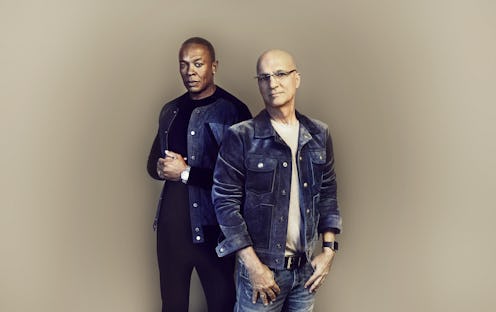
HBO's new docuseries, The Defiant Ones, retreads the long, lucrative partnership between record exec Jimmy Iovine and illustrious rapper-producer Dr. Dre. Separately, they've been behind some of the biggest musical triumphs of the last few decades; Together, they've built an empire — more than one, in fact. But their pairing is largely considered an unlikely one, and many may not know how Jimmy Iovine and Dr. Dre met in the first place.
The two come quite literally from opposite worlds. Iovine grew up on the East Coast, in Brooklyn, as the son of a longeshoreman and secretary. Dre, born Andre Young, was raised in Compton, California. Iovine held a number of odd jobs before meeting a songwriter who got him a gig cleaning a music studio, where he fell into a career as a recording engineer. After producing albums for the likes of John Lennon, Bruce Springsteen, and Stevie Nicks throughout the '70s and '80s, he co-founded Interscope Records with Ted Field in 1990. Soon afterward, Dre — fresh off a breakout run with hip-hop pioneers N.W.A. — brought Iovine his debut solo album, The Chronic. As Iovine recounted in a 2014 G.Q. interview:
"I’d just come out of Rattle and Hum with U2. I knew hip-hop was going around, but I had no idea what it was. And then Dre walked in, and I said, 'I don’t know hip-hop, but I know my speakers. Who engineered it?' Dre said, 'I did.' When they told me the story of how they made the record, you might as well make a record falling out of a building. They were sneaking into studios; the government was after them; there were lawsuits, one RICO case, all on a bunch of guys who had no money and were making an album. I said, 'Wow. If you can do it under those circumstances, let’s go.'"
Interscope went on to market and distribute Dre and Suge Knight's Death Row Records throughout the early '90s, releasing seminal rap albums like Snoop Dogg's Doggystyle and 2Pac's All Eyez On Me. After Dre departed Death Row, he and Iovine teamed again in 1996 for Dre's own label, Aftermath, which has been home to artists like Eminem, 50 Cent, and Busta Rhymes.
Then, a decade later, Iovine, hungry for new ventures, ran into Dre one day on the beach. Dre told him he was thinking about making sneakers, but Iovine quickly threw out the idea.
"I said, 'Dre, nobody in the world cares about how you dress or will care about your sneakers. What you should sell is speakers,'" Iovine explained during a 2014 convention at the University of Southern California. "At that moment, he said to me, 'We can do that?' And I said, 'F*ck yeah.'"
And thus, Beats by Dre was born. Iovine and Dre founded the company in 2006 and debuted their first product two years later. In 2014, Apple purchased Beats by Dre for a staggering $3 billion, and Iovine stepped down from Interscope to run it (later, he also helped Apple spearhead its streaming service, Apple Music). According to Wired, Beats now accounts for 34 percent of US stereo headphone sales.
Dre, for his part, hosted his own radio show, "The Pharmacy" on Beats 1, put out his so-called final album, Compton, via Apple in 2015, and is set to star in and executive-produce Apple's first original scripted TV series, Vital Signs, a semi-autobiographical show about his life.
Retrace the details of Dre and Iovine's improbable but wildly successful partnership when The Defiant Ones premieres July 9.